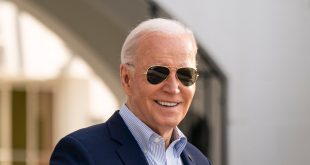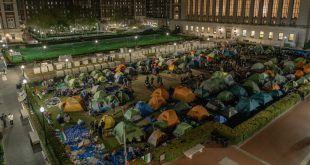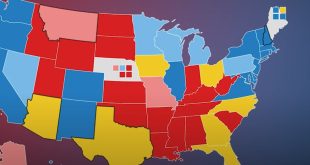President Biden on Wednesday began a tour of rural communities at a Minnesota hog farm where he lamented the loss of family farms, attacked the corporate consolidation of agriculture and pledged to oversee a renaissance of the American heartland.
The president’s efforts to focus attention on the domestic economy ahead of next year’s campaign have come after three weeks in which his administration has been seized by events overseas following the terrorist attacks in Israel and the country’s subsequent military action in Gaza.
Speaking in front of a tractor to a crowd in a machine shed, Mr. Biden credited “intense and urgent American diplomacy” for the evacuation on Wednesday of Americans, wounded Palestinians and other foreign nationals from Gaza. Then he pivoted to the economy at home.
He told a well-worn story of the “hollowing out of Main Street” and noted the more than 400,000 farms that have gone out of business in the past four decades, sending young people far from home to look for better job prospects. Mr. Biden insisted that tax incentives and federal investments from laws his administration helped push through Congress were “transforming” parts of the United States that have been hurting economically.
Mr. Biden also announced more than $5 billion in funding for agriculture, broadband and clean energy needs in sparsely populated parts of the country. The White House has called the next two weeks of events the “Investing in Rural America Event Series.” It includes more than a dozen trips by Mr. Biden and other senior officials to bring a spotlight to the administration’s economic agenda.
“My plan is about investing in rural communities,” Mr. Biden said. “It’s about something else as well. It’s about restoring pride to rural communities that have been left behind for far too long.”
Whether rural Americans, who are increasingly voting Republican, buy that message ahead of the 2024 presidential election is another story.
“People in a lot of rural communities are feeling neglected,” said Dee Davis, the president of the Center for Rural Strategies, a nonpartisan advocacy group.
Mr. Davis said that discontent was clear in a recent poll his group conducted of rural Americans across 12 states.
“People in a lot of rural communities are not optimistic about what’s coming next, how they are fitting into the economy,” he said, adding that the poll suggested that about a third of rural voters might be persuadable but that many felt underappreciated by both parties.
The rural funding announcements on Wednesday included $1.7 billion for farmers to adopt so-called climate-smart agriculture practices; $1.1 billion in loans and grants to upgrade infrastructure in rural communities; $2 billion in investments as part of a program that helps rural governments work more closely with federal agencies on economic development projects; $274 million to expand high-speed internet infrastructure; and $145 million to expand access to wind, solar and other renewable energy.
Mike Peterson, 60, who operates a soybean farm in Northfield, said he and other farmers continued to have concerns about inflation and the rising cost of energy in particular. Mr. Peterson said he operates solar and wind energy on his farm, but he worries the Biden administration is moving too fast toward clean energy.
“Most people in rural America understand that all forms of energy are needed,” he said. “But I just don’t think we can leave petroleum behind or have it be this expensive.”
Gov. Tim Walz of Minnesota, a Democrat, said he expected Mr. Biden to face serious headwinds in rural communities, in large part because of inflation levels.
“It is a little challenging, there’s no denying, when prices go up,” Mr. Walz said. “The politics have gotten a little angrier. I think folks are feeling a little behind.”
But he and other Democrats say it is important for the president to spend as much time as possible in rural parts of the country.
“You have to show up,” said Senator Amy Klobuchar, Democrat of Minnesota.
Kenan Fikri, the director of research at the Economic Innovation Group, a Washington think tank, said the Biden administration had made sizable investments over the past two and a half years in agriculture, broadband and other rural priorities.
“The administration has a lot to show for its economic development efforts in rural communities,” Mr. Fikri said, but “whether voters will credit Biden for a strong economic performance is another question.”
Later in the week Agriculture Secretary Tom Vilsack will travel to Indiana, Wyoming and Colorado to speak with agricultural leaders and discuss land conservation. Deb Haaland, the interior secretary, will go to her home state of New Mexico to highlight water infrastructure investments.
Energy Secretary Jennifer M. Granholm will be in Arizona to talk about the electricity grid and renewable energy investment in the rural Southwest.
The veterans affairs secretary, Denis McDonough, plans to visit Iowa to discuss improving access to medical care for veterans in rural areas. Isabel Guzman, who leads the Small Business Administration, will travel to Georgia to talk about loans for rural small businesses.
Miguel A. Cardona, the education secretary, will go to New Hampshire to promote how community colleges help students from rural areas. Xavier Becerra, the secretary of health and human services, will be in North Carolina to talk about health care access in rural areas.
 Top Naija News: Nigerian News, Breaking News Nigeria and World News Top Naija News is a daily news publication in Nigeria, delivering the latest breaking news in Nigeria and around the world.
Top Naija News: Nigerian News, Breaking News Nigeria and World News Top Naija News is a daily news publication in Nigeria, delivering the latest breaking news in Nigeria and around the world.



